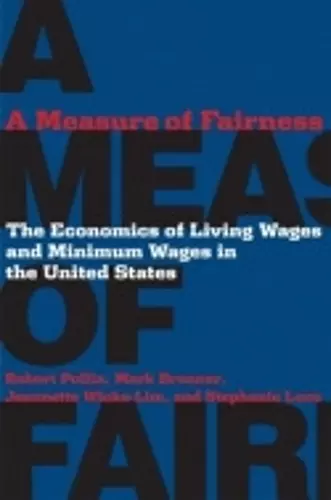A Measure of Fairness
The Economics of Living Wages and Minimum Wages in the United States
Robert Pollin author Jeannette Wicks-Lim author Stephanie Luce author Mark Brenner author
Format:Paperback
Publisher:Cornell University Press
Published:24th Jan '08
Currently unavailable, and unfortunately no date known when it will be back
This paperback is available in another edition too:
- Hardback£108.00(9780801445583)

In early 2007, there were approximately 140 living wage ordinances in place throughout the United States. Communities around the country frequently debate new proposals of this sort. Additionally, as a result of ballot initiatives, twenty-nine states and the District of Columbia, representing nearly 70 percent of the total U.S. population, maintain minimum wage standards above those set by the federal minimum wage.In A Measure of Fairness, Robert Pollin, Mark Brenner, Jeannette Wicks-Lim, and Stephanie Luce assess how well living wage and minimum wage regulations in the United States serve the workers they are intended to help. Opponents of such measures assert that when faced with mandated increases in labor costs, businesses will either lay off workers, hire fewer low-wage employees in the future, replace low-credentialed workers with those having better qualifications or, finally, even relocate to avoid facing the increased costs being imposed on them.The authors give an overview of living wage and minimum wage implementation in Louisiana, New Mexico, Arizona, California, Massachusetts, and Connecticut to show how these policies play out in the paychecks of workers, in the halls of legislature, and in business ledgers. Based on a decade of research, this volume concludes that living wage laws and minimum wage increases have been effective policy interventions capable of bringing significant, if modest, benefits to the people they were intended to help.
"As organizers in this movement, we often say 'We don't win because we're right—we win because we out-organize our opponents.' But it also doesn't hurt to be right. This book—like all the great work it compiles—reminds us that we are indeed right. It should make the job of every living wage—organizer that much easier." -- Jen Kern, Director of Living Wage Resource Center, ACORN
"Beginning with an insightful, inspiring history of the living wage movement, A Measure of Fairness provides an indispensable and user-friendly guide to understanding the economic consequences of living wage policies. It is a must-read for local activists, economists, and all political leaders concerned with economic justice. Bravo." -- Carol Oppenheimer and Morty Simon, activists with the Santa Fe Living Wage Network
"Beyond the clear economic arguments and the fascinating presentation of facts, this book's great merit is the authors' deep and sincere concern for those individuals who contribute to the economy to the best of their ability but are rewarded so little." -- Ariel Rubinstein, Tel Aviv University and New York University
"Robert Pollin and his colleagues give us a thorough and original look at that popular and enduring American institution, the minimum wage. They show that minimum wage hikes have not eliminated jobs or been bad for business, rebutting the naysayers with impeccable econometric evidence. Economists, they make the moral case, too, with powerful normative reasoning." -- Ann Markusen, Humphrey Institute of Public Affairs, University of Minnesota
"The study of living wages in the United States has moved from an odd peripheral topic to a major issue in economic policy analysis largely because of the research reported in A Measure of Fairness. This volume defines the issues and provides a glow of empirical sunlight on an economic topic traditionally shrouded with ideology instead of evidence." -- Richard B. Freeman, Harvard Economics, Labor and Worklife Program, Harvard Law School, and National Bureau of Economic Research
ISBN: 9780801473630
Dimensions: 235mm x 155mm x 19mm
Weight: 454g
312 pages